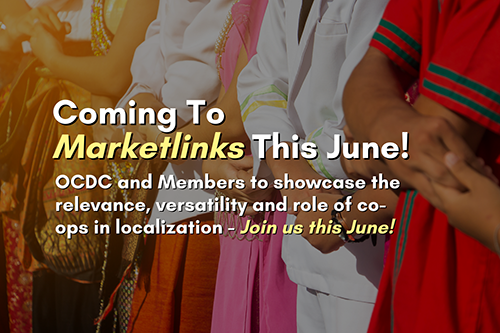 Agriculture and food security, democracy, human rights and governance, economic growth and trade, environment and global climate change, gender, and women’s empowerment. What sectors do you work in? Whatever they may be, in the quest to increase local efforts for a more resilient, prosperous, democratic, and inclusive world, there has never been a better time to focus on cooperatives!
Agriculture and food security, democracy, human rights and governance, economic growth and trade, environment and global climate change, gender, and women’s empowerment. What sectors do you work in? Whatever they may be, in the quest to increase local efforts for a more resilient, prosperous, democratic, and inclusive world, there has never been a better time to focus on cooperatives!
What is a Cooperative? A cooperative is an autonomous association of persons united voluntarily to meet their common economic, social, and cultural needs and aspirations through a jointly owned and democratically controlled enterprise.
More than 3 million cooperative businesses exist around the world in industries from finance (credit unions, SACCOS), agribusiness, energy, health, housing, IT, and more to serve and support their members.
Throughout June, the U.S. Overseas Cooperative Development Council (OCDC) is partnering with Marketlinks to bring you stories that illustrate the evidence and impact of cooperatives in locally-led development. You will hear from OCDC’s International Cooperative Research Group (ICRG) and OCDC members:
- ACDI VOCA
- Equal Exchange
- Frontier Co-op
- GENEX
- Global Communities
- HealthPartners
- Land O’Lakes Venture37
- NCBA CLUSA (Read: Indigenous Women in Guatemala Turn to Cooperatives to Protect Their Environment and Grow Their Business)
- NRECA International
- World Council of Credit Unions
Blog posts on localization, finance, policy, gender, youth, and climate actions will showcase how cooperatives are uniquely suited to address today’s global development challenges. At the end of the month, a webinar will highlight the relevance of cooperatives and their role in advancing USAID’s localization policy.
Through their locally led, democratic, and inclusive business model, cooperatives make an important contribution to building stable economies and societies in today’s development settings. What Difference Do Cooperatives Make research conducted by ICRG in Kenya, Peru, the Philippines, and Poland, demonstrates that cooperatives make both an economic and social difference, including:
- Economically, cooperative members are more likely than the general population to have average or above average incomes and are less likely to be poor.
- Cooperative members enjoy a better sense of overall well-being, financial security, and trust in their community than nonmembers. During times of need, cooperative members have improved access to social support systems and other resources that support their resilience and ability to weather adverse events.
- Women members gain independence and agency from cooperative membership. Cooperatives offer training, support, and leadership opportunities to women, with wide-reaching impacts on their well-being.
- Cooperative members value the seven cooperative principles and share a common identity. A key cooperative principle is “concern for community,” which is reflected in cooperatives’ social program offerings.
- Cooperatives are a dynamic force for self-determination, and they contribute to creating communities where all people — including women, youth, and the most vulnerable — have an opportunity to improve their livelihoods. Cooperatives go where for-profit businesses will not and provide economic opportunities and services in places others find unprofitable or too risky. For many economically disadvantaged and isolated people, joining a cooperative is the best option to help them reach financial stability.
We hope you’ll join OCDC on this Marketlinks journey through cooperatives leading up to the International Day of Cooperatives on July 2. Marking the 100th anniversary of the global emphasis day, this year’s theme is “Cooperatives Build a Better World.”
OCDC and its members are all implementers of USAID’s Cooperative Development Program (CDP) under the Local, Faith, and Transformative Partnerships of the Bureau for Development, Democracy, and Innovation. The CDP is a locally demand-driven and iterative initiative supporting cooperatives in the sectors of agriculture, finance, health, energy, and information technology.


